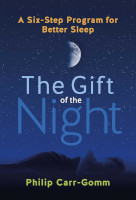
In this Article:
- What influences individual sleep patterns and how to identify yours.
- Are there benefits to identifying as a lark or an owl in terms of sleep?
- How understanding your sleep story can improve your sleep quality.
- Steps you can take to determine your optimal bedtime.
- How does aligning bedtime with natural tendencies impact health?
Are You a Lark or an Owl: Understanding Sleep Patterns
by Philip Carr-Gomm.
Some good news: Researchers have found that people consistently overestimate their lack of sleep, so you may mistakenly believe you are not sleeping as much as you really are.
You tell yourself, I didn’t sleep at all last night, but even as you say this, you remember those dreams you had. Research suggests we “stitch together” our memories of the times we were awake, leaving out the periods of sleep we had in between, and hey presto, our memory tells us that we were awake endlessly!
That little piece of information above shows us that it’s worth taking some time to really think about our sleep life—to uncover its story.
Are You Really Sleeping Well?
I once gave a seminar on sleeping better to a group of managers of a chain of cafés in Brighton. As we sat around one evening in one of the branches after hours, sitting in a circle with glasses of wine, I invited each manager to share their experience of sleeping.
Here are some of the things they said.
One young woman in her twenties, who started off by saying she didn’t have any problems sleeping, admitted on the second round of sharing that she would curl up on a sofa and watch television until she fell asleep with the TV still on. Later, she talked about how it was because she was frightened to actually go to sleep.
Others talked about how their partners’ snoring kept them awake, which had led them to question whether they should start sleeping in separate rooms. Others suffered from sleep maintenance insomnia, also known as biphasic or dual-phased sleep, finding it quite easy to go to sleep but then waking up a few hours later, only to find that they were unable to get back to sleep easily, sometimes lying awake for hours before nodding off again.
What was interesting about this shared conversation that night in the café was seeing how everybody, even those who weren’t experiencing sleep difficulties, still had a story to tell about periods when they hadn’t slept well, and about what they had discovered about their sleep, or about themselves more generally.
It confirmed a basic tenet of psychotherapy: that talking about your life as a story is an extremely helpful way to understand yourself and begin to resolve any difficulties you’re experiencing.
Exercise: Telling Your Sleep Story
Your sleep story is part of the wider story of your life, and you can explore and articulate it just to yourself or to a friend or therapist. You can do the following exercise together. If you’re on your own, speak your response to the following questions into your voice memo. Write them down if you feel like it, or just think through or speak your responses out loud.
Here’s the exercise: Try telling your sleep story.
* When did you first experience difficulties in sleeping?
* Was it related to any particular event?
* How long has it gone on for?
* How does it manifest? Does it change?
* Is it cyclical? Is it affected by the phases of the moon?
* Is it affected by your emotions?
* How would you characterize the difficulty you face?
* How would you describe it?
* And what are the effects on your body?
* What does your body have to say about it?
Your initial reaction may be that you know darned well what your sleep, and any lack of it, is like and how it makes you feel, but these questions are encouraging you to go into detail, to go a little deeper. At one level they are encouraging you to have a conversation with your body.
Continue by looking at your dream life.
* Do you remember your dreams?
* Do they go in seasons?
* Do you ever experience sleep talking or walking, sleep paralysis, frequent nightmares or “night terrors”?
* Do you trace the start of your sleep problems to the menopause or doing shift work?
Sleep Apnea
Have you ever considered that you might have sleep apnea, which involves not breathing for sometimes numerous times during the night? If you or your partner notice that your breathing stops and starts while you sleep, or that you make gasping, snorting, or choking noises while you sleep; and you often feel very tired during the day, you need to check this out.
Experts suggest that 1.5 million people in the UK are likely to suffer from sleep apnea, with only 20 percent having been diagnosed. You can find home tests online. If you find you might have this condition, see your doctor right away.
Scoping Out Your Sleep Situation
It’s important to note here that in telling your story, you’re not looking for solutions or trying to fix anything. This is just a first step. You’re scoping out the situation.
If you go to a sleep clinic or see a specialist to work on your sleep difficulties, they will get you to fill out a long form where you rate yourself on a scale from 1 to 10 on many aspects of your sleeping and waking life. And then they might ask you to keep a “sleep diary” for a while to track your sleep patterns.
These are important and valuable tools that help the clinician understand the difficulties you’re facing and what the best treatment program will be, but here we’re working in a different way: on the value simply of articulating your story. There’s nothing you need to do with this, except express it, so that it becomes, if you like, a picture or movie that you can see, rather than something that is only semi-conscious.
Just this work of bringing an understanding of your story into consciousness is valuable in itself, as anyone will know who has experienced good psychotherapy or even simply good listening and skilful questioning from a caring friend. It’s not even about drawing any conclusions or finding any meaning in the story. A great deal of the value in this work arises out of simply doing it.
When Should I Head for Bed?
Once you have a sense of the pattern and nature of your sleep life, you can look at a helpful way of coming to understand this pattern, which can also help you work out your optimal bedtime.
Begin by asking your body when it would like to go to bed each night. What does it say to you? Try asking this question without preempting the answer. Even though you think you know what the answer is, just try it.
Sometimes people are quite surprised by their body instantly replying that they want to go to bed at a different time to the one usually picked. This may not be the case for you, of course, but see what sort of response comes up.
Now ask yourself if you’re a lark or an owl. Do you feel better in the mornings or evenings? If you had to do a particular task that required concentration, would you pick the morning or the evening to do it?
Depending upon your answer, ask yourself whether your bedtime matches this. If you’re an owl and you feel best late at night, are you able to organize your life so you can go to bed late and wake up late, and vice versa?
Copyright ©2023. All Rights Reserved.
Adapted with permission of the publisher,
|Findhorn Press, an imprint of Inner Traditions Intl.
Article Source:
BOOK: The Gift of the Night
The Gift of the Night: A Six-Step Program for Better Sleep
by Philip Carr-Gomm.
About the Author
Article Recap:
This article delves into the importance of understanding personal sleep patterns and how categorizing oneself as either a lark or an owl can influence optimal bedtime decisions. It highlights the significance of recognizing and narrating one's sleep experiences as a therapeutic exercise to uncover underlying sleep issues and improve sleep management. The discussion extends to practical advice on aligning bedtimes with individual circadian rhythms to enhance sleep quality and overall life satisfaction.




 Philip Carr-Gomm is an author and psychotherapist, trained in psychology, sophrology, and psychosynthesis psycho therapy. The founder of the Sophrology Institute, he also works in the emerging field of psychedelic psychotherapy. Philip runs a sleep clinic that offers online sleep therapy and is the author of more than twenty books.
Philip Carr-Gomm is an author and psychotherapist, trained in psychology, sophrology, and psychosynthesis psycho therapy. The founder of the Sophrology Institute, he also works in the emerging field of psychedelic psychotherapy. Philip runs a sleep clinic that offers online sleep therapy and is the author of more than twenty books.
























